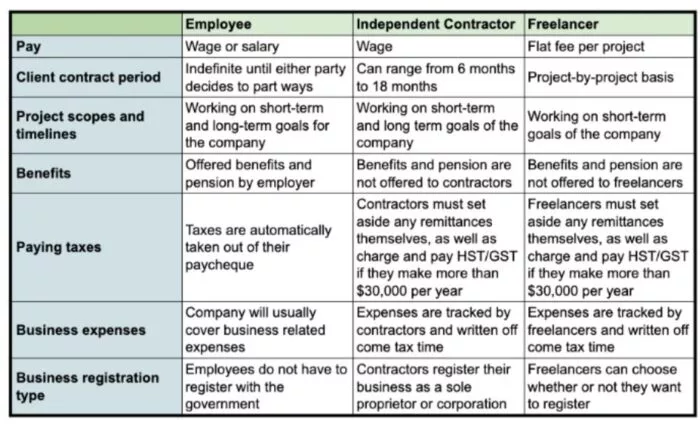Best Contractor Management software
Our Contractor Management Software guide includes some of the best software for businesses, including Deel, Remote, TalentDesk, and monday.com.
What to look for in contractor management software
Features
The features offered by a contractor management software will influence the program you select. The features you need is dependent on the needs of your company. Take some time to consider why you want a contractor management software and how the program can benefit your company. Once you figured out the answers to those two questions, you will know what features you should prioritize.
Here are the three common features of contract management software:
- Compliance Management: Ensures that an organization complies with industry and security standard as well as corporate and regulatory policies and requirements. For example, the software ensures that a company meets a countries labour laws when hiring international talent.
- Job Management: This feature monitors an organization’s workflow. Tasks can be created and assigned to team members. The status of a project can be updated (in production, completed, etc.). Schedules and deadlines can also be created.
- Time Tracker: This feature will track the hours an employee/contractor worked on a project. This comes in handy when it comes to paying employees/contractors for their services.
Ease of use
Ultimately, a contractor management software should make your work life easier; it should simplify things. The software should also be easy for your customers to use. If the software is confusing and difficult to use, then it is not worth your time and money. It can also harm your business in a big way. To test ease of use, sign up for a free account or use the free trial. If those are not offered, read customer reviews to get a sense of how easy the software is to use.
Availability
The global availability of a contractor management software can be important factor, especially if you have international clients. Some programs support numerous countries, while others have a more limited range. Double check to see which countries the software supports.

RemotePass

Globalization Partners

Multiplier

Contractor Compliance

WorkMarket

TalentDesk

Remote

Deel
Contract management software questions
What is contractor management?
According to Wikipedia, contractor management supervises outsourced work for an individual company. It uses a system that manages the contractor’s health and safety information, insurance information, payroll, and other specific documents that are essential. You can also use contractor management software to manage projects and assign tasks to employees as well as hire new talent from around the globe. Lastly, contractor management software helps companies maintain compliance with labour laws for various countries.
How can contractor management software help me?
Using contractor management software has several advantages. Overall, it makes it easier for companies to organize and keep track of financial documents such as payroll, insurance information, and billing. If you need to hire contractors and employees from different countries, contractor management software will help you maintain compliancy with labor laws. Contract management software can also help you manage multiple projects.
How much does contractor management software cost?
Prices will vary between products. The cost for basic plans will range between $10-$50, while prices for premier plans can fall between $80-$200. Most contractor management software will have a free account, and many will have a free trial.
How do I manage a contractor?
Since contractors are not permanent employees, the way you manage them will be different. According to Harvard Business Review, the relationship between managers and independent contractors is less formal and rigid. However, there still needs to be some active managing in order to get the best work out of the contractor.
On a personal level, it is crucial to establish a healthy working relationship between yourself and a contractor. Before work is started, ask the contractor what they hope to achieve from the project. This will show what their goals and needs are. Once the contractor starts the project, take the time to build up the relationship. You can ask them about their interests, other projects they have worked on etc. Make them feel like a part of your permanent team. Doing this will increases the chances of you working with the same contractor in the future. Just make sure you don’t over do it. Your compliance department might worry that the contractor will look too much like an employee, which has legal and tax ramifications.
In terms of the actual project, it is important to be clear on what you need the contractor to produce. Whether it be a brochure, house, or website, having a document that outlines the project and deadlines will eliminate confusion for both parties. As the project proceeds, don’t hesitate to provide feedback. There is no need for a formal review but providing a contractor with some informal feedback will strengthen the relationship and improve their performance. Even though feedback is encouraged, be careful of micromanaging. Most contractors enjoy the freedom the have. Trying to control their schedule and work habits will sour the relationship and possibly end the job contract.
The last thing worth mentioning is to compensate your contractor well. Pay them at the market rate. And if you are satisfied with their work, you can even throw in a bonus package.
However, if the contractor is underperforming or acting in an unprofessional manner, do not hesitate to end the agreement.
Harvard Business Review has two case studies on managing contractors. You can check them out here.
Freelancer vs independent contractor: What’s the difference?
Freelancers and independent contractors are very similar, but they are different from each other. First, let’s define both position titles.
Freelancers are self-employed workers who provide their services to several organizations. They can work on several projects at the same time. Their time working for a company is temporary. Being a freelance worker gives you the freedom of setting your own rates, choosing where you work, and processing your taxes independently. Some examples of freelance workers are journalists, photographers, and video editors.
Independent contractors are also temporary workers who can work for several clients at the same time. Contractors tend to work on larger projects for longer periods of time. A contractor may work out of their own space, or they can work at the client’s workplace. Most contractor’s accept jobs through an agency specific to their field. Common examples of independent contractors are doctors, lawyers, and professional wrestlers.
The difference between the two positions mainly lies in scheduling, payments, and the tasks worked on. Freelancers control their schedule, which means they can work at any time of the day. There still may be deadline to meet, but in general the work schedule is very flexible. While some independent contractors set their own hours, most have a traditional schedule like 9 a.m. to 5 p.m. In terms of salary, independent contractors work an hourly rate that can vary for different clients and jobs. If you use an agency to get contracts, the agency will set a salary for you. Freelancers have the freedom to set their own rates for a job. They can decide whether to have an hourly rate or charge by the project. While independent contractors and freelancers can choose the projects they work on, the scope of the projects will be different. Contractors typically work on larger projects with longer timeframes. This limits the number of jobs you can work on at the same time. Freelancers mostly work jobs that are smaller in scale. This lets them work for several clients at once.
The following photo from QuickBooks highlights the differences between independent contractors, freelance workers, and employees.

Source: QuickBooks




